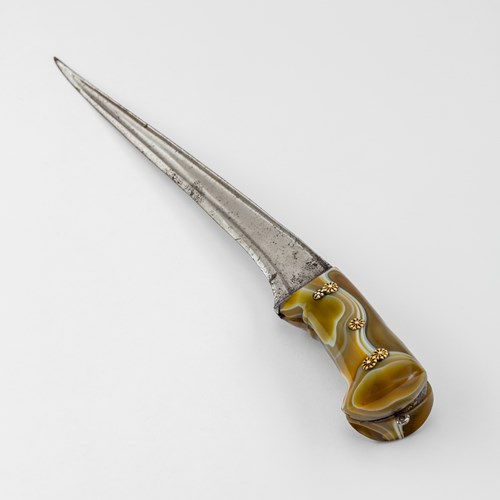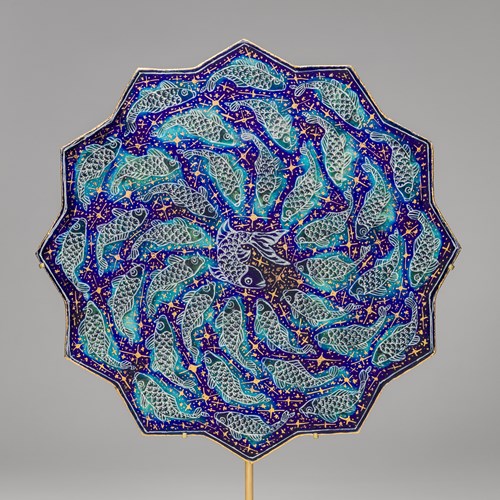Marketplace
Zafar Takiya with Jade Handle
A zafar takiya (lit. ‘throne of victory’) was a chin or arm rest set on a cane used by Sufi saints and mendicants when they sat cross-legged on the ground. The concealed blade would be used for protection from wild animals the saints might encounter while travelling and meditating. The zafar takiya might have been used as a symbolic gift at the Ottoman court or among the nobility. This example is a composite piece, with an Indian jade chin rest, fitted with an Ottoman sword and sheath.
Of light greyish green colour, the jade crutch handle curves outwards to rounded terminals, each ornamented by a five-petalled flower. The base of the handle is surrounded by acanthus leaves, which complement the vegetal ornamentation elsewhere on this zafar takiya. The sheath is constructed from wood coated in silver, terminating in a bulb. It is decorated with niello, a technique whereby engravings are filled with a black mixture made of sulphur, silver, and copper or lead. Concealed within the sheath is a steel blade with double hollow grind. The 8cm long ricasso, the unsharpened portion of the blade above the hilt, is damascened with swirling vegetal motifs and a Turkish couplet. Split between the two sides of the blade it reads:
جاننه قصد ایلمه کلمه یقین
دشمانک رحم ایلمز کندینی صقین
‘Do not make an attempt on [the owner's] life, do not come close!
The enemy is merciless, protect yourself!’
A Mughal jade crutch handle together with its jade shaft is illustrated in Teng Shu-p’ing, Exquisite Beauty: Islamic Jades, National Palace Museum. Taipei: 2012, p. 116, pl. 137. The Metropolitan Museum of Art, New York, holds two examples of jade handled zafar takiya (accession nos 36.25.734 and 36.25.1001a,b).
Zafar takiya are truly cross-cultural items, crafted by Armenian Ottomans from recycled Indian jade handles, which had entered the Ottoman Empire with families such as the Chalebi merchants of Surat.1
1 Afzal Khan, Mohd. ‘The Chalebi Merchants at Surat 16th – 18th Centuries’, Proceedings of the Indian History Congress 40 (1979). pp. 408-418: p. 408.
n.b. accession nos are clickable links
Of light greyish green colour, the jade crutch handle curves outwards to rounded terminals, each ornamented by a five-petalled flower. The base of the handle is surrounded by acanthus leaves, which complement the vegetal ornamentation elsewhere on this zafar takiya. The sheath is constructed from wood coated in silver, terminating in a bulb. It is decorated with niello, a technique whereby engravings are filled with a black mixture made of sulphur, silver, and copper or lead. Concealed within the sheath is a steel blade with double hollow grind. The 8cm long ricasso, the unsharpened portion of the blade above the hilt, is damascened with swirling vegetal motifs and a Turkish couplet. Split between the two sides of the blade it reads:
جاننه قصد ایلمه کلمه یقین
دشمانک رحم ایلمز کندینی صقین
‘Do not make an attempt on [the owner's] life, do not come close!
The enemy is merciless, protect yourself!’
A Mughal jade crutch handle together with its jade shaft is illustrated in Teng Shu-p’ing, Exquisite Beauty: Islamic Jades, National Palace Museum. Taipei: 2012, p. 116, pl. 137. The Metropolitan Museum of Art, New York, holds two examples of jade handled zafar takiya (accession nos 36.25.734 and 36.25.1001a,b).
Zafar takiya are truly cross-cultural items, crafted by Armenian Ottomans from recycled Indian jade handles, which had entered the Ottoman Empire with families such as the Chalebi merchants of Surat.1
1 Afzal Khan, Mohd. ‘The Chalebi Merchants at Surat 16th – 18th Centuries’, Proceedings of the Indian History Congress 40 (1979). pp. 408-418: p. 408.
n.b. accession nos are clickable links
More artworks from the Gallery









